- Home
- Seanan McGuire
Magic for Nothing Page 35
Magic for Nothing Read online
Page 35
The tent above us was taking its cue from the ropes, and beginning to burn. If we didn’t get out of here soon, we weren’t going to be getting out of here at all. I ran to Sam, praying silently that I wasn’t too late.
He’d landed on his back when he fell. The blood was coming from a shallow gash down the side of his head. Robert was too good of a shot to have miscalculated that badly, and at such a short range; there had to be something else going on. I dropped to my knees, fumbling for a pulse, and paused when I found it, not in the expected spot, but lower and off to the side. Sam’s anatomy wasn’t exactly human-normal. I knew from the way he jumped and swung me around that he had to have incredibly robust musculature. Incredibly robust musculature, in nature, often meant a denser skeleton, giving those muscles something to anchor against.
The tent was burning and Robert was dead and I still laughed through my tears as I leaned forward and pressed my forehead against Sam’s, not caring if I got blood on myself. “You big dumb ape,” I said. “You are literally too thick-headed to kill.” The bullet must have ricocheted when Robert pulled the trigger. It would have been a shock to both of them—in Sam’s case, a shock big enough to put him on the floor.
Sam groaned. I sat up, grabbing his arm and trying to tug him along with me.
“Come on, wake up,” I said. “This place is about to go up like a birthday cake.”
He groaned again, opening his eyes. He smiled at the sight of me. Something in my chest got tight and soft at the same time, like I was trying to sneeze with a mouthful of ice cream.
“Hey,” he said, in a dazed voice. “So I just got shot.”
“Yeah,” I agreed, laughing a little. It was better than crying. Those felt like my only options at the moment.
“Am I dead?”
“Not yet. Can you walk?”
“Not yet.”
“Okay. I’m going to get you to your feet. Can you focus enough to go human? You weigh less without all the extra muscle mass.” Sam’s speed had saved my life, and his fūri bone density had saved his. That didn’t mean I could carry a six-foot-tall monkey-man who wasn’t in a position to help me. There are limits.
“I can try.” Sam closed his eyes again, grimacing. Slowly, his simian features melted away, replaced by the frowning man who’d met me on my first day in the bone yard. Without the fur to blunt the edges of the wound, the trench the bullet had dug into his forehead was substantially more brutal-looking. If he’d been human when Robert had pulled the trigger . . .
Five minutes ago I’d been asking myself whether I could kill another human being. Now I found myself wishing I could bring him back to life so I could kill him again for what he’d almost done.
Gingerly, I worked my arm under Sam’s shoulders and half-helped, half-pulled him to his feet. The heat from the burning ceiling was becoming increasingly apparent, although chunks of canvas had not yet started falling on us. That was coming. Once the fire traveled down the tent walls and began really getting to work, everything was going to collapse in on itself.
Sam held on as best as he could, head lolling and eyes still closed as I steered him toward the door. I only looked back once, in time to see the burning web of the trapeze break apart and fall onto the net. The heart of the carnival was dying. The rest would follow. I’d done this; it was on me. I turned away. I needed to focus on getting myself out, and on keeping Sam alive. If I could do those things, someday I might be able to forgive myself.
We stepped through the tent flap, into the cool, clean air of the Minnesota night. I froze, bringing Sam stumbling to a stop.
“What?” he mumbled, not opening his eyes.
“Problem,” I said.
Margaret Healy, who was holding a pistol in her hands and had a vicious bruise stretching across her throat, sneered.
Twenty-four
“Happy endings are for fairy tales. Try to focus on the ending that comes with the chance to start again.”
—Enid Baker
The midway of the Spenser and Smith Family Carnival, in the midst of an unwanted family reunion
“LOOK,” I SAID. “Can’t we talk about this?”
Margaret’s sneer grew. “I should have known,” she said. “You were too bloody perfect, and you were so eager. You wanted to help. I trusted you. I thought you were going to be one of us. Should have known you were a liar and a thief and a traitor born. Did they send you to punish me?”
I blinked. “Okay, you lost me.” Sam was a heavy weight on my shoulder, eyes still closed, not moving. He hadn’t spoken since he’d asked why we’d stopped. I knew he was conscious—he hadn’t reverted to his fūri form—but he wasn’t up for doing much beyond keeping himself awake. If I dropped him, that might distract Margaret for a moment. Not long enough. In a fight between gun and knife, the person with the gun already out and ready to fire is always, always going to win.
“Your bastard branch of the family,” snarled Margaret. “Did they send you to punish me for not being one of them? For being loyal and committed and willing to do what’s required to serve my species? You’re the ones who lost your way, not me, but I’m the one who has to live with the consequences of your actions. So answer me. Did they send you as a test?”
I gaped at her, preparing to say something about how none of this had been personal. I stopped myself. The things she was saying, the way she was saying them . . . I’d heard them before. It was just that they’d always come from my own lips, and been directed at my sister. Verity, who did whatever the hell she wanted and left the rest of us to clean up her mess. Verity, the golden child.
Verity, who’d never been trying to hurt me, any more than I’d been trying to hurt Margaret. Choices had consequences, and yes, sometimes those consequences could get other people hurt, but that didn’t make them personal. That didn’t make them intentional. It just made them something else that had to be resolved.
“I’m sorry,” I said.
Margaret flinched. “What did you say to me?”
“I said, I’m sorry. I’m sorry my great-great-grandparents had to leave their children when they left the Covenant; I’m sorry you grew up thinking you came from a family of traitors when really, you come from a family of impassioned, intelligent people trying to do the best they can. I’m sorry we abandoned you. I’m sorry we’re never going to be a family in anything more than blood.” The gulf between us was too great. I wasn’t going to come around to her way of thinking, and she certainly wasn’t going to come around to mine.
“You’re trying to trick me,” snarled Margaret, and steadied her aim. I realized, with a sick, sinking feeling that she wasn’t aiming at me anymore. If she pulled the trigger, the bullet was going to go right through Sam’s heart. Even shifting back to his natural form wouldn’t save him from that. “I’ll make you a deal, cousin. Come with me willingly, so we can learn everything you know, and I won’t shoot your boyfriend dead in front of you.”
“But you’ll shoot him later,” I said wearily.
“He’s not human. He’s a threat. He has to die.”
“I’m not going to surrender.”
“Then you’re going to hold him while he dies, and I’m going to take you anyway.” Her lips drew back from her teeth in a noiseless snarl. “You pretended to be my friend. Well, you’re going to be my redemption. You’re going to—”
She stopped mid-sentence, an odd look spreading across her face. Then she fell forward, hitting the ground hard, revealing the man who was standing behind her with a hypodermic needle in his hand.
“Dilute manticore venom has a remarkable sedative effect when injected by someone who knows what they’re doing,” Leo said. There was a brittle sort of serenity in his voice. He was holding his composure by a thread.
“What are you doing?” I asked, sliding my free hand behind my back and beginning to slowly draw a knife from my waistband. “Wh
ere’s Chloe?”
“I sent her to the car to bandage her wounds. I convinced her we could handle things without her.” He looked down at Margaret, lying face down in the mud. “My sister is a little credulous sometimes. It comes of being excessively sheltered.”
“Why . . .” I paused. “Why are you helping me?”
“Did you kill Robert?”
The knife was in my hand. I nodded mutely.
“But you didn’t kill Chloe, and I could tell you didn’t want to kill Margaret.” Leo looked at Sam and frowned. “Did Robert shoot your friend?”
Another nod. It would be so easy to throw the knife, to catch him unawares. I hesitated. My time with the Covenant might not have changed my loyalties, but it had humanized them in a way I hadn’t been counting on. They weren’t a faceless enemy anymore. They were people. They had done to me exactly what my sister had worked so hard to do to Dominic: they had made themselves harder to kill.
“Then it’s no wonder.” Leo dropped the needle into the mud, crunching it under his foot. Behind me, the tent began to blaze more fiercely, the flames crackling as they devoured the canvas. He looked at me calmly. “It’s too bad one of your friends managed to catch Margaret by surprise. You ducked back into the tent to regroup. You burned to death.”
“What?” I stared at him. “Why would you do that?”
“Because you could have killed my sister, and you didn’t. Because I’ve been reading the reports on your progress. You killed the Jorōgumo that had been hunting people. You didn’t hesitate once you knew she was dangerous. You’re going to come back into the fold, and when you do, you’re going to be remarkable. I can wait for you. For a little while, I can wait.” Leo’s smile was quick and cold. “You’ll find I can be surprisingly patient.”
I stared at him. Finally, I said, “You knew. From the start, you knew.”
“Oh, come now. You don’t think the heir to the Covenant would be able to identify any member of an approved bloodline? I’ll admit, you threw me at first. No one’s seen a Price—a true Price—in so long. Who would have thought the Carew blood would be such a beast? Half the Healys look like Carews since we let Enid marry into the line. It was the cheekbones. I knew I’d seen them before. I went to Penton to check the portrait gallery, and once I realized what we had . . .” He shook his head. “It was too delicious. I had to get to know you. And truly, you’ve exceeded my expectations. I can’t wait for you to choose us over the errors of your upbringing.”
“So you’ll let me walk away?”
“Why wouldn’t I?” He seemed genuinely puzzled. “Any damage you do now happens under my grandfather’s watch. When my time comes, I’ll be the one who brings the Price family back where they belong. My predecessors could never accomplish that. So go, Timpani, or Antimony, or whatever you want your name to be. Go now, and go knowing that one day, you’ll come back to me. I’ll find you. When I want you, I’ll find you.”
I stared at him for a moment, all too aware of the burning tent at my back and the weight of Sam on my arm. That was what made up my mind. Sam couldn’t handle another fight, and if I lost—if Leo killed me—he would be defenseless. He wasn’t even supposed to be here. I was not going to burn down Emery’s carnival and get her grandson killed in the same night.
Adjusting my grip on Sam, I offered Leo one last, silent nod and turned to walk, slowly, away from the burning tent, into the waiting darkness. Putting my back to a member of the Covenant was a calculated risk. I was trusting him not to pull a gun and shoot me as soon as I was defenseless.
He didn’t. Sam hanging heavy off my arm, I left the fire, and the blood, and the carnival behind.
The bone yard was a ghost town. About half the RVs were there, but all their occupants were gone. I stopped at the Ferris wheel to retrieve my backpack before helping Sam to the first safe place I found—a flatbed truck old enough to be hotwired if the fire reached this far—and lowering him onto the tailgate. He was still human, which meant he was still awake.
“Hey,” I said softly. “If you can stay like this while I clean your forehead, that would be great. If you can’t, I’ll work around it.”
“Sure, Grandma,” he mumbled.
I smiled to conceal my worry. “Wow, I’m your grandmother now? What’s the word for an Oedipus complex that skips the mother and goes straight back up the line?” I slipped out of my backpack and unzipped it, rummaging until I found my first aid kit.
“Ask Zeus,” he said.
“Now you’re making jokes about the King of fucking everything that moves,” I said, pulling out a gauze pad and soaking it with antiseptic. “This is going to sting.” I pressed the pad against Sam’s forehead.
His eyes snapped open. “Holy shit.”
“I told you it was going to sting.” I kept dabbing at the wound. It was deep enough to worry me. The bullet must have bounced straight off the bone. “Also, hi. Congrats on not being dead, you dick.”
“Hey. You’d have been in real trouble without me and you know it.”
“I do.” I kept dabbing at the wound. “I’m in real trouble now. I need you to do something for me.”
“Anything.”
He didn’t mean that—people never mean it when they say “anything”—but it was still nice to hear. “I need you to get my mice to an airport.”
Sam blinked. “Come again?”
“If you get them to an airport, they can catch a flight to where the rest of my family is. They’re good at sneaking onto airplanes. They’ll be fine.” The mice were also good at finding unattended phones. They’d fly to Portland, phone the house, and get picked up. They could tell my family what had happened. They could help them prepare.
“Why aren’t you taking them yourself?”
I began applying butterfly closures to the wound on his forehead. “Because I need to go somewhere else. Someplace where no one can find me.”
“What? Annie—”
“The Covenant knows my name and my face and where to look for me. Killing everyone who came here wouldn’t have changed that; it would just have made me more of a target. I was careful, but they have things I’ve touched. I sweated in their training room. I bled—fuck, they did blood tests on me. They could have vials of the stuff, and they have witches. There’s a chance they’re going to track me, and if they do, I’m not leading them to my family.” If I’d been able to slip away, I might have been okay, but I hadn’t done that. I’d stayed, and I’d fought, and now they knew I wasn’t just a trainee who’d chosen to run. It didn’t matter if my reasons had been good and my choices had made sense at the time. They knew too much.
I had to disappear.
“I’ll come with you.”
I put the final butterfly closure in place before pressing my hand against his cheek and smiling at him. He smiled back, tentatively. I leaned in and kissed him, trying to put everything I had—every explanation, every apology, every scrap of affection I had—into the contact. His lips tasted like blood. Mine tasted like ashes. Together, we were a world on fire, and we never stood a chance.
Finally, I pulled back and said, “No, you won’t. You’ll find your grandmother. Help her start a new show. And get my mice to that airport.”
“Annie . . .” He stopped. Looked at me. And finally said, “I don’t love you yet. But I could have.”
“Same here,” I said, and kissed him again, and reached into my backpack. When I pulled my hand out again, Mork and Mindy were on my palm. I set them down beside him. Neither of them said a word. No cheering, no psalms, nothing. I nodded to them. They nodded back. Then I turned and walked away.
I didn’t look back. Sometimes not looking back is the only mercy the world has left to show.
Epilogue
“Family is family, no matter how far away you run. Their ghosts will always find you.”
—Jane Harrington-Price
/>
A small frontage road near Gainesville, Florida
Three weeks later
IT WAS THE MIDDLE OF THE DAY, and no one wanted to pick up a hitchhiker. I kept my thumb out anyway as I walked, trying not to look like the humidity was killing me. It was a lie. I felt like I was going to melt. (Portland is not a high-humidity city. Humidity takes too much commitment, and Portland virtually never commits to severe weather.)
Another car went zooming by. I did not flip them off. I thought I deserved some sort of reward for that—like maybe, I don’t know, a ride?
It had been three weeks since I’d walked away from the carnival, and bit by bit, the road was killing me. The Covenant didn’t know all my IDs, but my cousin Artie did, which meant I didn’t dare use any of my credit cards. I’d hit the first ATM I’d seen, pulled out the maximum, and thrown the card away. That cash had seen me across seven states, onto several buses, and through a delightful assortment of diners, each a little more questionable than the last. But the money was running out, and hitchhiking was my best option, if I wanted to stretch it as far as possible.
“I’d kill for a new pair of shoes right now,” I muttered.
“Be careful where you say that sort of thing.”
I turned. Mary was behind me, her hair loose and blowing in the slight afternoon breeze, so that it formed a cottony corona around her head. I looked down, and winced. We were standing at a crossroad.
“I didn’t mean it,” I said quickly, looking up again.
Her smile was thin and sad, a skeleton of an expression, painted on the face of a ghost. “I know,” she said. “You didn’t do all the flowery bullshit that makes it a real request. You should still be careful. The crossroads know your name.”

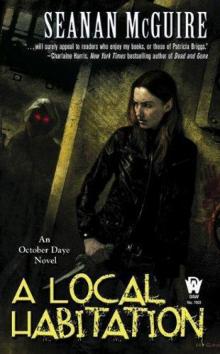 A Local Habitation
A Local Habitation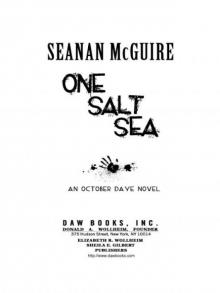 One Salt Sea
One Salt Sea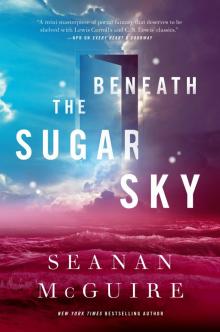 Beneath the Sugar Sky
Beneath the Sugar Sky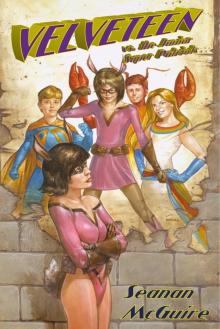 Velveteen vs. The Junior Super Patriots
Velveteen vs. The Junior Super Patriots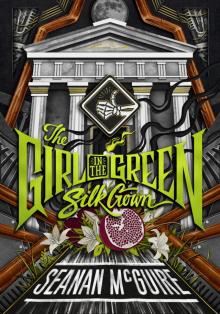 The Girl in the Green Silk Gown
The Girl in the Green Silk Gown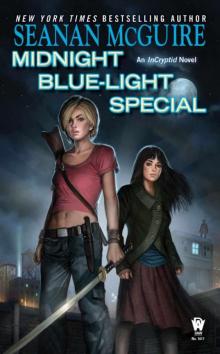 Midnight Blue-Light Special
Midnight Blue-Light Special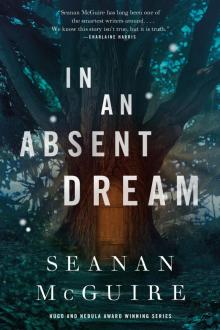 In an Absent Dream
In an Absent Dream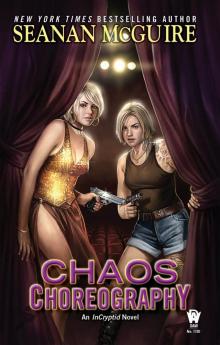 Chaos Choreography
Chaos Choreography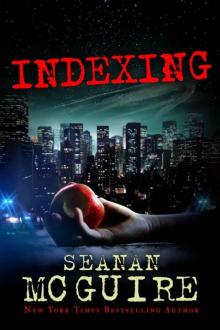 Indexing
Indexing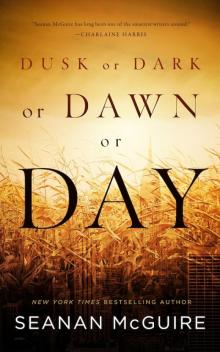 Dusk or Dark or Dawn or Day
Dusk or Dark or Dawn or Day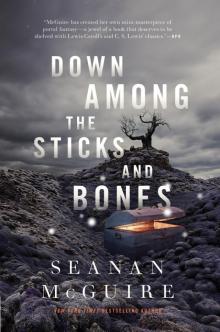 Down Among the Sticks and Bones
Down Among the Sticks and Bones The Razor's Edge
The Razor's Edge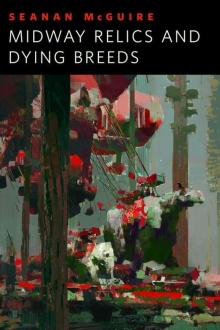 Midway Relics and Dying Breeds
Midway Relics and Dying Breeds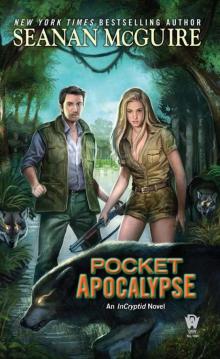 Pocket Apocalypse
Pocket Apocalypse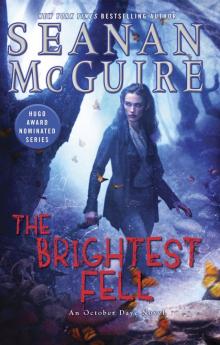 The Brightest Fell
The Brightest Fell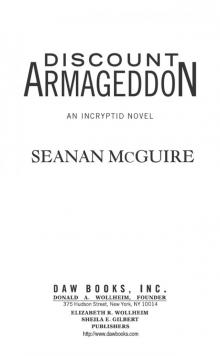 Discount Armageddon
Discount Armageddon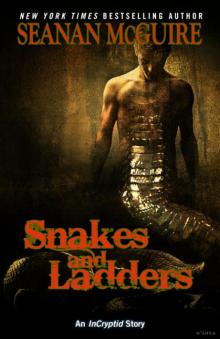 Snakes and Ladders
Snakes and Ladders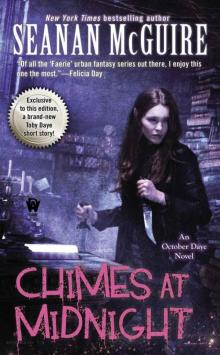 Chimes at Midnight
Chimes at Midnight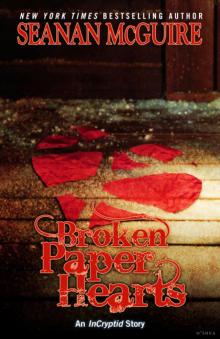 Broken Paper Hearts
Broken Paper Hearts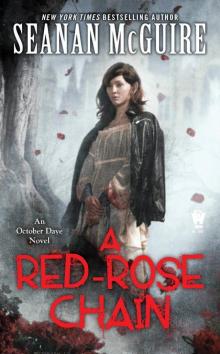 A Red-Rose Chain
A Red-Rose Chain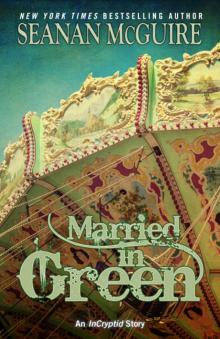 Married in Green
Married in Green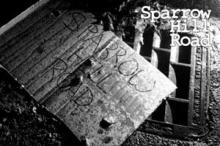 Sparrow Hill Road 2010 By Seanan
Sparrow Hill Road 2010 By Seanan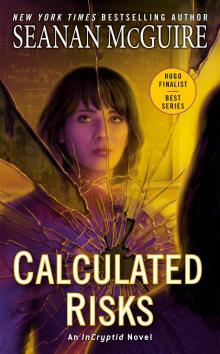 Calculated Risks
Calculated Risks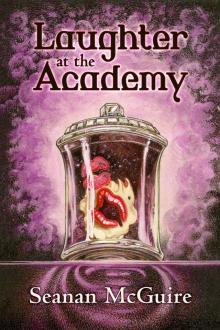 Laughter at the Academy
Laughter at the Academy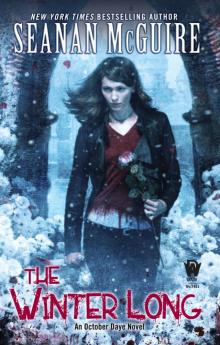 The Winter Long
The Winter Long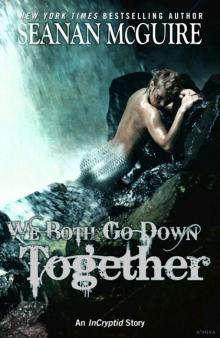 We Both Go Down Together
We Both Go Down Together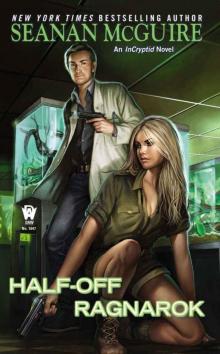 Half-Off Ragnarok
Half-Off Ragnarok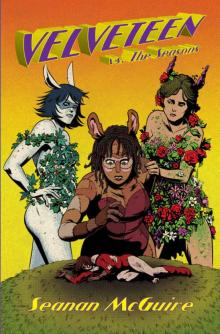 Velveteen vs. The Seasons
Velveteen vs. The Seasons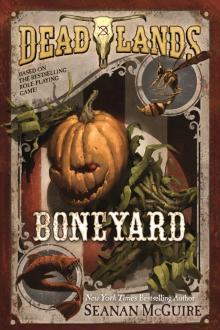 Boneyard
Boneyard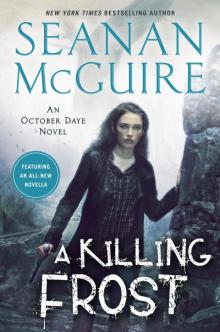 A Killing Frost
A Killing Frost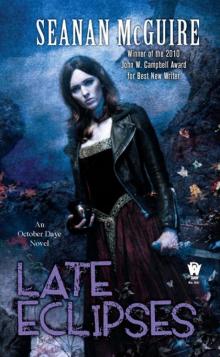 Late Eclipses
Late Eclipses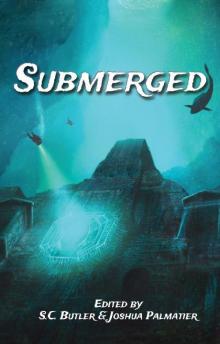 Submerged
Submerged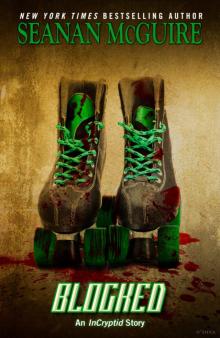 Blocked
Blocked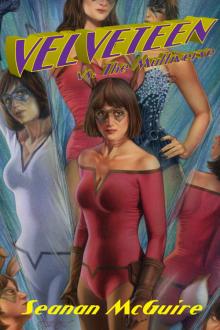 Velveteen vs. The Multiverse
Velveteen vs. The Multiverse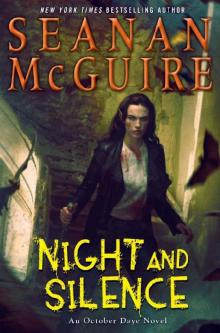 Night and Silence
Night and Silence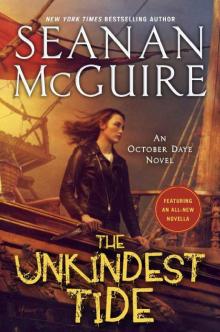 The Unkindest Tide (October Daye)
The Unkindest Tide (October Daye)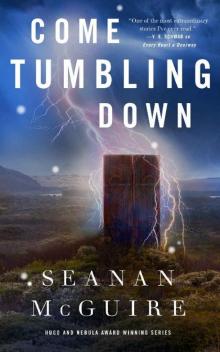 Come Tumbling Down (Wayward Children)
Come Tumbling Down (Wayward Children)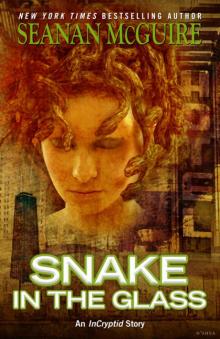 Snake in the Glass
Snake in the Glass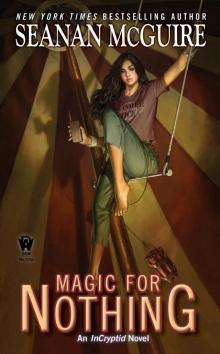 Magic for Nothing
Magic for Nothing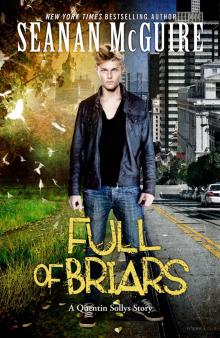 Full of Briars
Full of Briars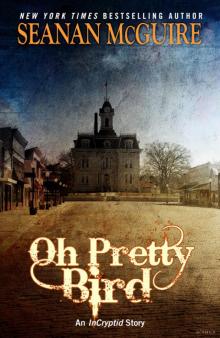 Oh Pretty Bird
Oh Pretty Bird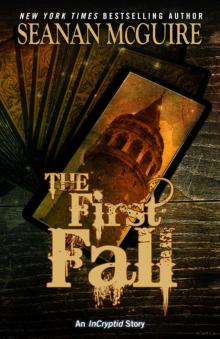 The First Fall
The First Fall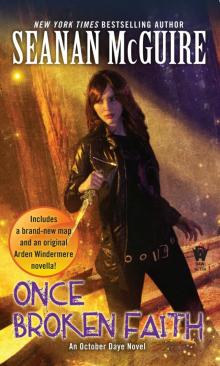 Once Broken Faith
Once Broken Faith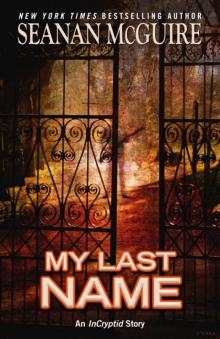 My Last Name
My Last Name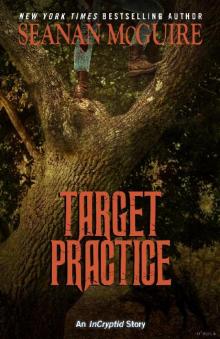 Target Practice
Target Practice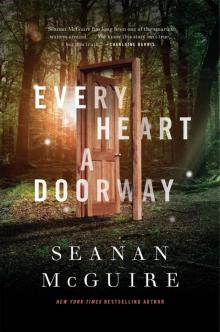 Wayward Children 01 - Every Heart a Doorway
Wayward Children 01 - Every Heart a Doorway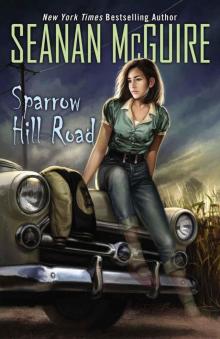 Sparrow Hill Road
Sparrow Hill Road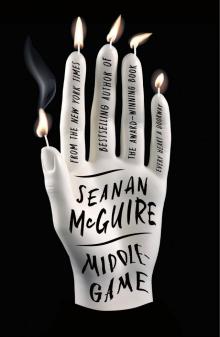 Middlegame
Middlegame Juice Like Wounds
Juice Like Wounds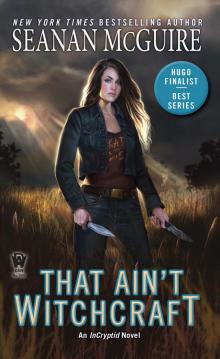 That Ain't Witchcraft
That Ain't Witchcraft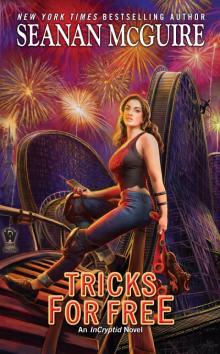 Tricks for Free
Tricks for Free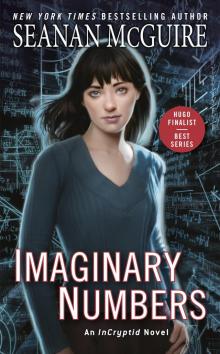 Imaginary Numbers
Imaginary Numbers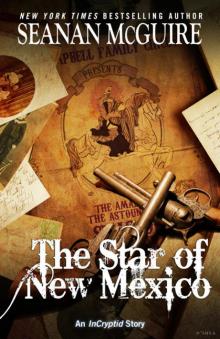 The Star of New Mexico
The Star of New Mexico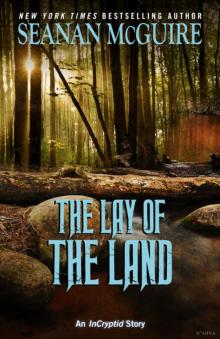 Lay of the Land
Lay of the Land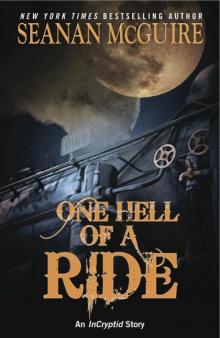 One Hell of a Ride
One Hell of a Ride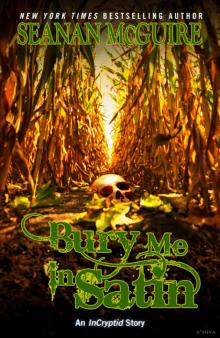 Bury Me in Satin
Bury Me in Satin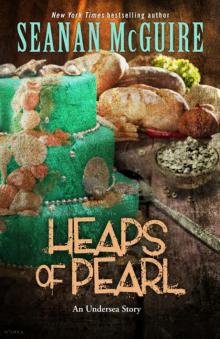 Heaps of Pearl
Heaps of Pearl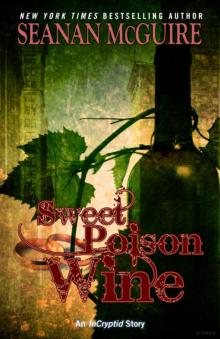 Sweet Poison Wine
Sweet Poison Wine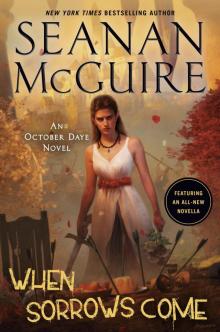 When Sorrows Come
When Sorrows Come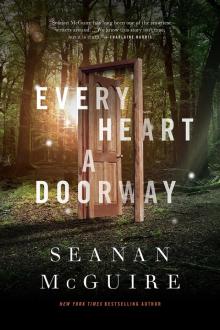 Every Heart a Doorway
Every Heart a Doorway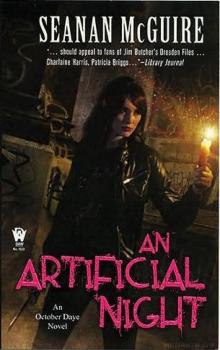 An Artificial Night - BK 3
An Artificial Night - BK 3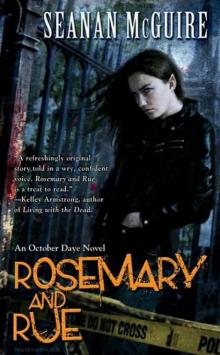 Rosemary and Rue
Rosemary and Rue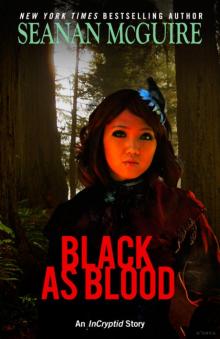 Black as Blood
Black as Blood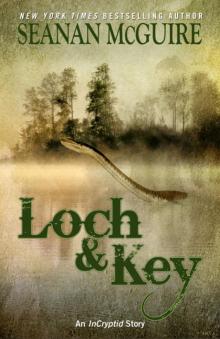 Loch and Key
Loch and Key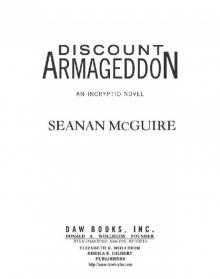 Discount Armageddon: An Incryptid Novel
Discount Armageddon: An Incryptid Novel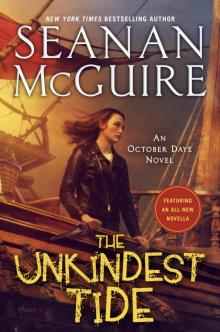 The Unkindest Tide
The Unkindest Tide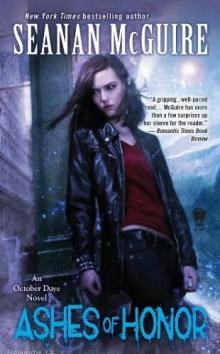 Ashes of Honor od-6
Ashes of Honor od-6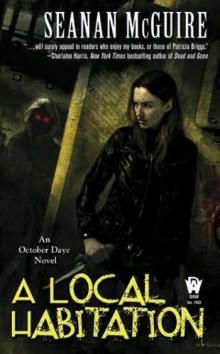 A Local Habitation od-2
A Local Habitation od-2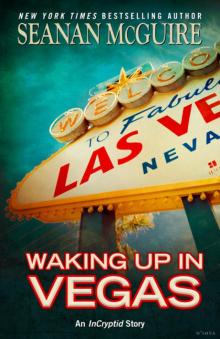 Waking Up in Vegas
Waking Up in Vegas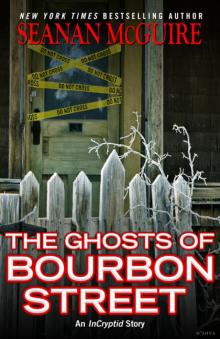 The Ghosts of Bourbon Street
The Ghosts of Bourbon Street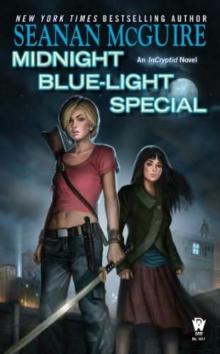 Midnight Blue-Light Special i-2
Midnight Blue-Light Special i-2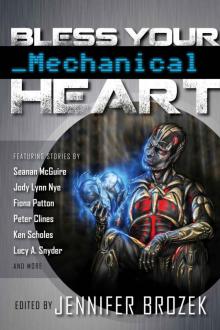 Bless Your Mechanical Heart
Bless Your Mechanical Heart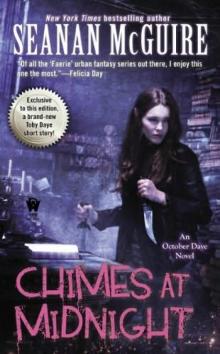 Chimes at Midnight od-7
Chimes at Midnight od-7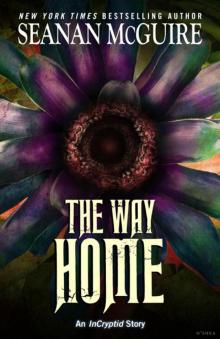 The Way Home
The Way Home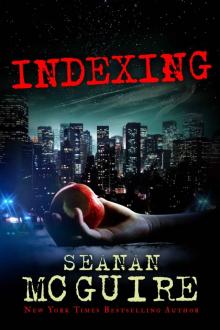 Indexing (Kindle Serial)
Indexing (Kindle Serial)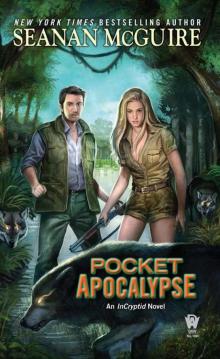 Pocket Apocalypse: InCryptid, Book Four
Pocket Apocalypse: InCryptid, Book Four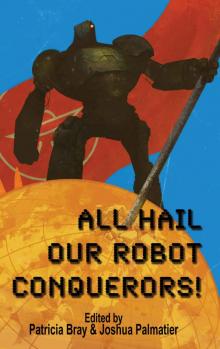 All Hail Our Robot Conquerors!
All Hail Our Robot Conquerors!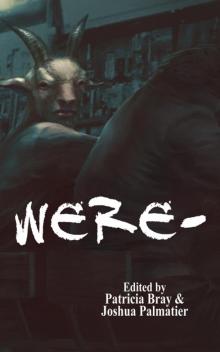 Were-
Were-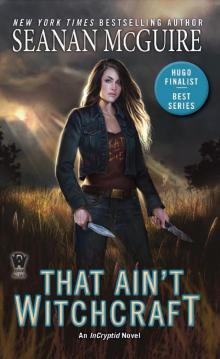 That Ain't Witchcraft (InCryptid #8)
That Ain't Witchcraft (InCryptid #8)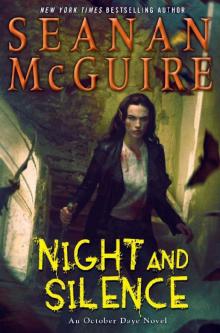 Night and Silence (October Daye)
Night and Silence (October Daye)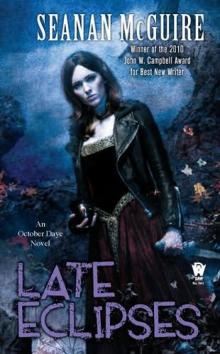 Late Eclipses od-4
Late Eclipses od-4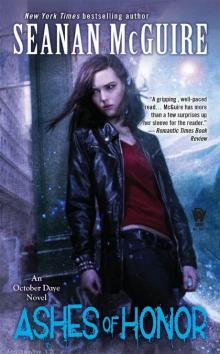 Ashes of Honor: An October Daye Novel
Ashes of Honor: An October Daye Novel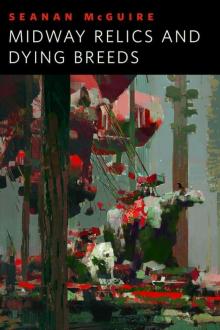 Midway Relics and Dying Breeds: A Tor.Com Original
Midway Relics and Dying Breeds: A Tor.Com Original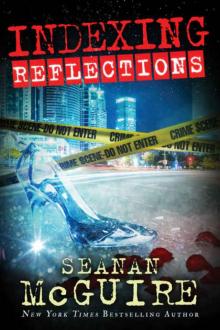 Indexing: Reflections (Kindle Serials) (Indexing Series Book 2)
Indexing: Reflections (Kindle Serials) (Indexing Series Book 2)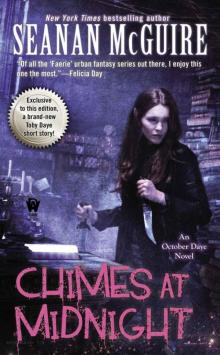 Chimes at Midnight: An October Daye Novel
Chimes at Midnight: An October Daye Novel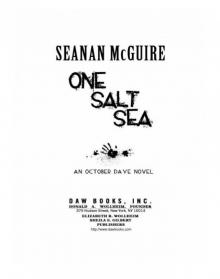 One Salt Sea: An October Daye Novel
One Salt Sea: An October Daye Novel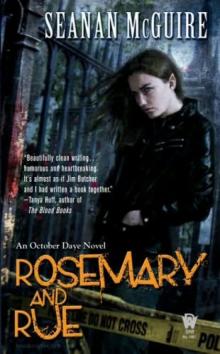 Rosemary and Rue od-1
Rosemary and Rue od-1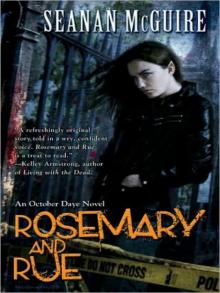 Rosemary and Rue: An October Daye Novel
Rosemary and Rue: An October Daye Novel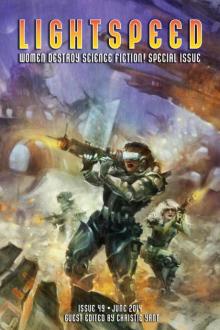 Lightspeed Magazine Issue 49
Lightspeed Magazine Issue 49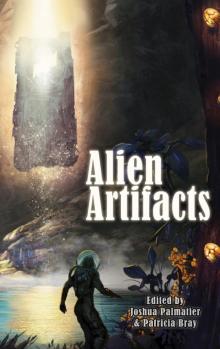 Alien Artifacts
Alien Artifacts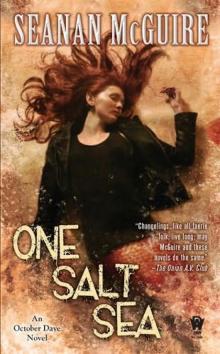 One Salt Sea od-5
One Salt Sea od-5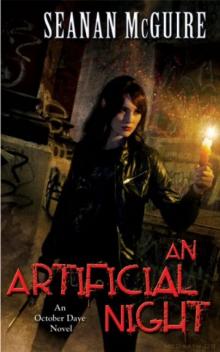 An Artificial Night od-3
An Artificial Night od-3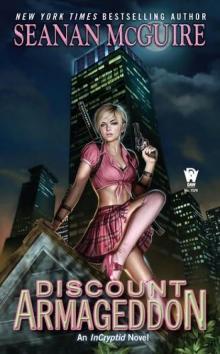 Discount Armageddon i-1
Discount Armageddon i-1